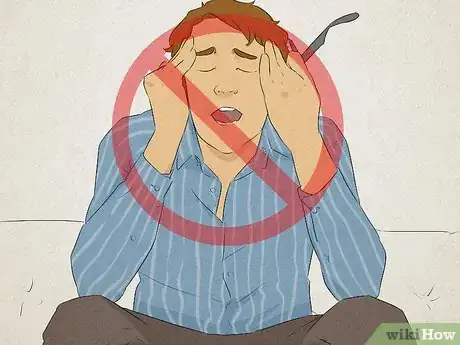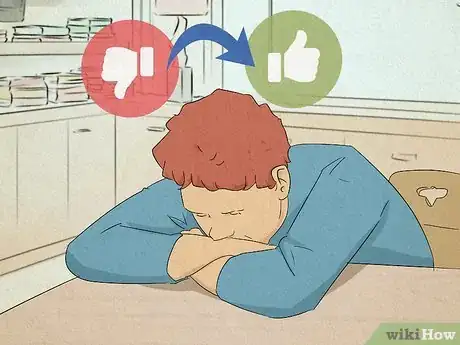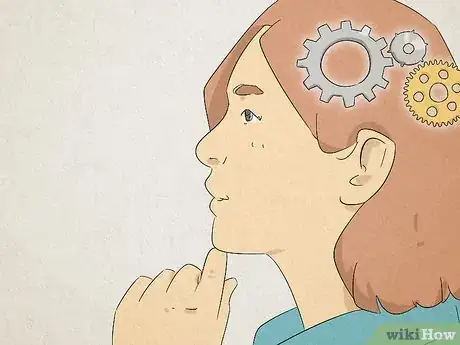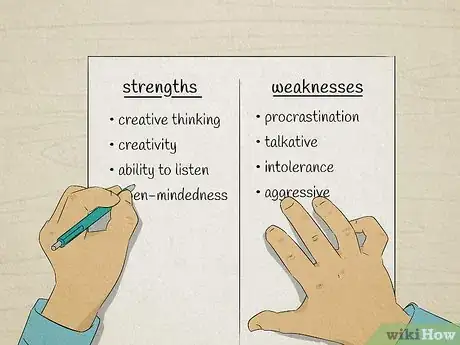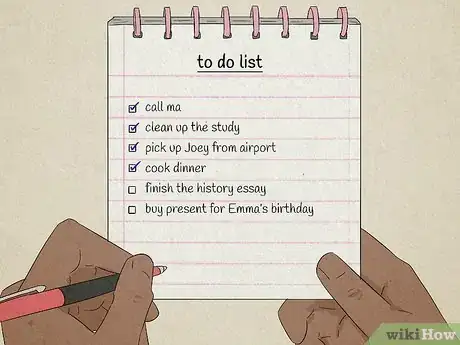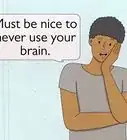This article was co-authored by Donna Novak, Psy.D and by wikiHow staff writer, Jessica Gibson. Dr. Donna Novak is a Licensed Clinical Psychologist based in Simi Valley, California. With over ten years of experience, Dr. Novak specializes in treating anxiety and relationship and sex concerns. She holds a BA in Psychology from the University of California, Los Angeles (UCLA) and a doctoral degree (Psy.D) in Clinical Psychology from Alliant International University-Los Angeles. Dr. Novak uses a differentiation model in treatment that focuses on personal growth by increasing self-awareness, personal motivation, and confidence.
There are 7 references cited in this article, which can be found at the bottom of the page.
This article has been viewed 67,798 times.
You can be your own worst critic. Maybe you said the wrong thing to someone, you made a mistake at work, or you feel like everyone's smarter than you at school. This doesn't mean you're stupid—everyone feels this way at some point! To help you turn your negative thoughts around, we've come up with positive suggestions that you can start trying today.
Steps
Figure out why you feel this way.
-
If you often feel stupid, think back to your earliest memory of this hurtful feeling. You might have had a relative tell you that you were dumb or maybe you grew up with parents who made you feel bad. Some people who have low self-esteem or anxiety might feel stupid. It's important to identify why you feel this way so you can address it.[1] X Research source
- Even if you make a silly mistake and feel stupid, you might find that you feel this way because you were embarrassed in front of classmates or co-workers.
Give yourself permission to mess up.
-
Being afraid to make mistakes can make you feel stupid, but you're not. Wanting to succeed is a natural desire, but you won't always do things right on the first try. Just because you need to fix something or do something again doesn't mean you're not smart. Tell yourself that it's alright to make mistakes and that it doesn't make you less intelligent.[2] X Research source
- This is especially important if your fear of feeling stupid is stopping you from trying new things or you're turning down opportunities.
Don't take yourself too seriously.
-
If you make a mistake or don't know something, don't feel ashamed. Acknowledge that you may need to learn something or do something different in the future, but don't take it to heart. Look for the humor in the situation—after all, no one's perfect.[3] X Research source
- For example, if you trip while walking up to your desk, instead of quietly thinking to yourself how stupid you are, make a joke! You might say, "Sorry everybody, this is my first time walking." A joke can break the tension and you can move on.
Change your negative thought to a positive one.
-
You're probably your own biggest critic so stop beating yourself up! When you notice yourself thinking, "I'm so stupid. I can't believe I did that," immediately stop yourself. Then, ask yourself if you'd say that to someone else. If you wouldn't, then don't be so harsh on yourself! Instead, move on with a positive mindset.[4] X Research source
- For example, if accidentally did the wrong assignment and turned it in, just tell yourself that you got some extra practice with that lesson. Then, move on and do the one you were supposed to.
Re-define your idea of intelligence.
-
It's easy to feel stupid if you don't test well or get high marks. The critical thing to remind yourself is that being smart isn't simply a number. Intelligence is about getting new information and skills—essentially, it's the learning process. Part of being smart is learning so you get what you want out of life.[5] X Research source
- Instead of saying, "I'm too stupid to get that job," you might sign up for a course so you're qualified for the position.
Focus on the things that you're great at.
-
Make a list to remind yourself of your skills and great qualities. Whenever you're feeling bad about yourself, read through the list. This is a simple, but really effective way to turn the focus from your negative feelings to an encouraging, supportive mindset.[6] X Research source
- For example, you might write that you're really great at leading people or that you make friends easily. If you're having trouble coming up with things, ask your friends and family to share ideas.
- You might try to add something positive to the list every time you read it.
Ask for explanations if you're confused.
-
Don't try to muddle through a project—ask for clarification. Have you ever gotten an assignment or project and felt totally confused? You're probably not alone—maybe your boss or teacher didn't give enough detail or they spoke too quickly for you to follow. It's completely fine to ask them to repeat and explain what they're looking for. It doesn't mean you're dumb, you just need clarification![7] X Research source
- Think of it this way—it's better to spend a few seconds getting a thorough overview of the project before you start rather than spending time re-doing it or fixing mistakes later.
Use checklists to prevent basic mistakes.
-
Follow a simple checklist or guideline so you remember what to do. Everyone gets distracted or makes mistakes and this can make you look stupid. If you frequently mess up and feel like it's reflecting poorly on you, come up with a checklist or list of facts that help you.[8] X Research source
- For example, if you work in a coffee shop and have to clean equipment, it can help a lot if you've got a step-by-step cleaning list.
- Say you need a quick reminder about how to place an order for your company. Set a list with a few key bullet points near your computer for easy reference.
Keep learning and move on from your mistakes.
-
If there's a gap in your knowledge that's bothering you, learn about it. By taking charge of what you don't know, you're empowering yourself. Sure, you'll probably forget things or mess up along the way, but don't let that stop you. Studies show that if you approach learning without being afraid of errors, you'll learn more effectively.[9] X Research source
- For example, if you fail a test, go over it later to see what you missed and how you can do better next time. The better prepared you are, the less nervous you'll be next time.[10]
X
Expert Source

Licensed Clinical Psychologist Expert Interview. 8 December 2020.
- For example, if you fail a test, go over it later to see what you missed and how you can do better next time. The better prepared you are, the less nervous you'll be next time.[10]
X
Expert Source
Reach out for help from a mental health professional.
-
If you're still struggling with feeling unintelligent, talk with a therapist. You may need to tackle your low-self esteem, anxiety, or another mental health issue and they can help! Many therapists use cognitive behavioral therapy where you challenge negative thoughts and recognize why you have them in the first place.
- Even just talking with friends or family members can help, too. They'll be able to reassure you of your great qualities.
You Might Also Like
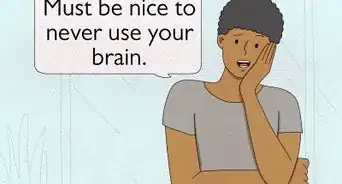 What to Say to Make Your Haters Back Off
What to Say to Make Your Haters Back Off


 Weaponized Incompetence: Definition & Examples
Weaponized Incompetence: Definition & Examples








References
- ↑ https://www.saltwire.com/atlantic-canada/lifestyles/ask-the-therapists-i-need-help-to-deal-with-feeling-so-stupid-322499/
- ↑ https://www.saltwire.com/atlantic-canada/lifestyles/ask-the-therapists-i-need-help-to-deal-with-feeling-so-stupid-322499/
- ↑ https://psychcentral.com/blog/psychology-women/2014/05/ever-say-something-stupid-get-to-know-your-shame#1
- ↑ https://www.psycom.net/negative-thinking
- ↑ https://www.bbc.com/future/article/20150422-how-not-to-be-stupid
- ↑ https://www.saltwire.com/atlantic-canada/lifestyles/ask-the-therapists-i-need-help-to-deal-with-feeling-so-stupid-322499/
- ↑ https://courses.lumenlearning.com/austincc-learningframeworks/chapter/chapter-10-active-listening-in-the-classroom/
- ↑ https://www.bbc.com/future/article/20150422-how-not-to-be-stupid
- ↑ https://www.annualreviews.org/doi/full/10.1146/annurev-psych-010416-044022
- ↑ Donna Novak, Psy.D. Licensed Clinical Psychologist. Expert Interview. 8 December 2020.
About This Article



